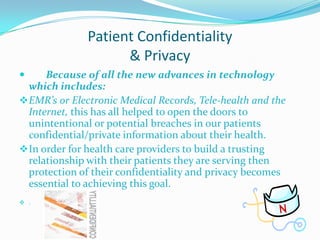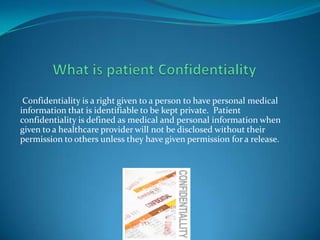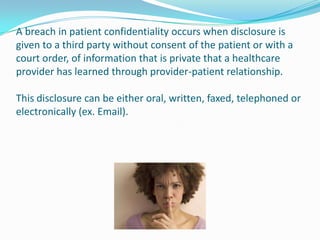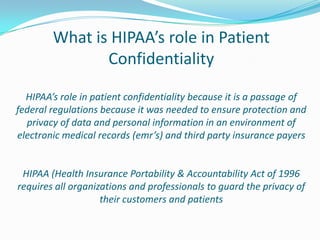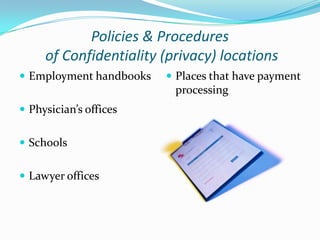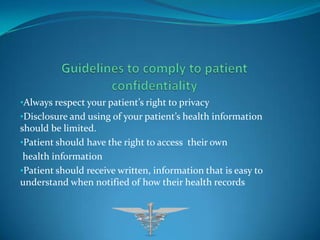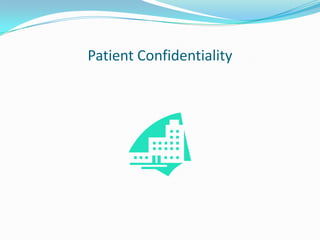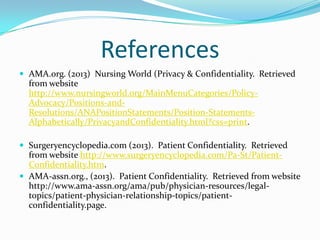Patient confidentiality 2
- 1. Alice Felton MHA 690 Health Care Capstone Dr. Sherry Grover January 31, 2013
- 2. Patient Confidentiality & Privacy ï Because of all the new advances in technology which includes: ïķ EMRâs or Electronic Medical Records, Tele-health and the Internet, this has all helped to open the doors to unintentional or potential breaches in our patients confidential/private information about their health. ïķ In order for health care providers to build a trusting relationship with their patients they are serving then protection of their confidentiality and privacy becomes essential to achieving this goal. ïķ .
- 3. Patient Confidentiality & Privacy, contd ïķIn order to achieve patient care quality it will usually require direct communication of pertinent information between health systems and/or health care professionals. ïķHealth care professionals and nursing staff who will be working regularly with their patients along with their medical records that should be kept Confidential should be able to comply with the development of any standards, laws and policies that are in place to protect their patientâs privacy (HIPAA) and the Confidentiality of their information/health records.
- 4. Confidentiality is a right given to a person to have personal medical information that is identifiable to be kept private. Patient confidentiality is defined as medical and personal information when given to a healthcare provider will not be disclosed without their permission to others unless they have given permission for a release.
- 5. A breach in patient confidentiality occurs when disclosure is given to a third party without consent of the patient or with a court order, of information that is private that a healthcare provider has learned through provider-patient relationship. This disclosure can be either oral, written, faxed, telephoned or electronically (ex. Email).
- 6. What is HIPAAâs role in Patient Confidentiality HIPAAâs role in patient confidentiality because it is a passage of federal regulations because it was needed to ensure protection and privacy of data and personal information in an environment of electronic medical records (emrâs) and third party insurance payers HIPAA (Health Insurance Portability & Accountability Act of 1996 requires all organizations and professionals to guard the privacy of their customers and patients
- 7. Policies & Procedures of Confidentiality (privacy) locations ï Employment handbooks ï Places that have payment processing ï Physicianâs offices ï Schools ï Lawyer offices
- 8. âĒAlways respect your patientâs right to privacy âĒDisclosure and using of your patientâs health information should be limited. âĒPatient should have the right to access their own health information âĒPatient should receive written, information that is easy to understand when notified of how their health records
- 10. References ï AMA.org. (2013) Nursing World (Privacy & Confidentiality. Retrieved from website http://www.nursingworld.org/MainMenuCategories/Policy- Advocacy/Positions-and- Resolutions/ANAPositionStatements/Position-Statements- Alphabetically/PrivacyandConfidentiality.html?css=print. ï Surgeryencyclopedia.com (2013). Patient Confidentiality. Retrieved from website http://www.surgeryencyclopedia.com/Pa-St/Patient- Confidentiality.htm. ï AMA-assn.org., (2013). Patient Confidentiality. Retrieved from website http://www.ama-assn.org/ama/pub/physician-resources/legal- topics/patient-physician-relationship-topics/patient- confidentiality.page.


